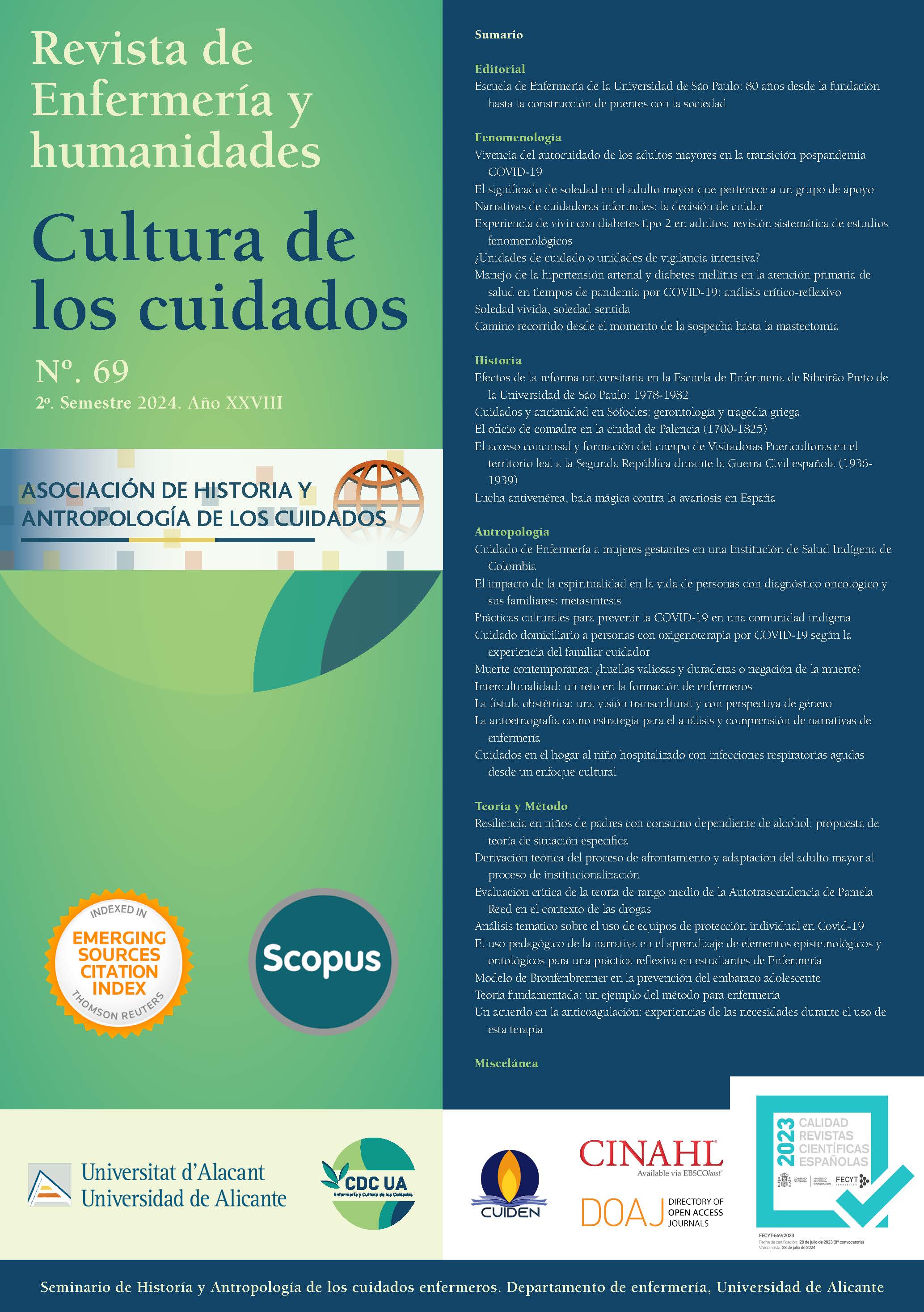La autoetnografía como estrategia para el análisis y comprensión de narrativas de enfermería
DOI:
https://doi.org/10.14198/cuid.26472Palabras clave:
Autoetnografía, enfermería, investigación cualitativa, narrativa personalResumen
Este artículo está dividido en tres partes. En primer lugar, a modo de una primera provocación, he señalado tres párrafos, para indicarle de manera general al lector, lo que posiblemente pueda encontrar dentro del contenido de este texto. Lo segundo, presentaré concretamente algunos aspectos conceptuales y metodológicos del abordaje autoetnográfico, entendiendo que esto no es una profundización en el tema, sino simplemente, una segunda provocación, para que lo consideré la o el lector - evaluador (que, para mí serían lo mismo) tomando una postura de lo que está leyendo, y tercero, mostraré un fragmento autoetnográfico propio, para señalar la escritura en autoetnografía iniciada a partir de una epifanía. Este ejercicio narrativo surge a partir de dos momentos concretos pero entrelazados: ser enfermero y ser padre de un hijo con Síndrome de Down.
Citas
Adams, T. (2011). Narrating the closet: An autoethnography of same-sex attraction (Primera). Left Coast Press, Inc.
Anderson, W. G., Puntillo, K., Cimino, J., Noort, J., Pearson, D., Boyle, D., Grywalski, M., Meyer, J., O'Neil-Page, E., Cain, J., Herman, H., Barbour, S., Turner, K., Moore, E., Liao, S., Ferrell, B., Mitchell, W., Edmonds, K., Fairman, N., … Pantilat, S. Z. (2017). Palliative Care Professional Development for Critical Care Nurses: A Multicenter Program. American Journal of Critical Care: An Official Publication, American Association of Critical-Care Nurses, 26(5), 361-371. https://doi.org/10.4037/ajcc2017336
Boykin, A., & Schoenhoffer, S. (Eds.). (2015). Theory of nursing as caring. En Nursing theories & nursing practice (Fourth edition, pp. 341-356). F.A. Davis Company.
Buller, H., Virani, R., Malloy, P., & Paice, J. (2019). End-of-Life Nursing and Education Consortium Communication Curriculum for Nurses. Journal of Hospice & Palliative Nursing, 21(2), E5-E12. https://doi.org/10.1097/NJH.0000000000000540
Couser, G. (1997). Recovering bodies: Illness, disability, and life writing. University of Wisconsin Press.
Cuskelly, M., Hauser-Cram, P., & Van Riper, M. (2008). Families of children with Down syndrome: What we know and what we need to know. Down Syndrome Research and Practice, 105-113.
Denzin, N. K., & Giardina, M. D. (2017). Qualitative Inquiry and the Politics of Research. Routledge. https://doi.org/10.4324/9781315397788
Ellis, C & Bochner, A. (2000). Autoethnography, Personal Narrative, Reflexivity: Researcher as Subject Research. 2000. 733-768. En Ed. Norman Denzin and Yvonna Lincoln. Sage (Ed.), Handbook of Qualitative Research (pp. 733-768).
Ellis, C., Adams, T., & Bochner, A. (2015a). Autoethnography: An Overview. Historical social research, 36(4), 273-290.
Ellis, C., Adams, T. E., & Bochner, A. P. (2015b). Autoetnografía: Un panorama. Astrolabio, 14(2), 249-273. https://doi.org/10.55441/1668.7515.n14.11626
Fitzpatrick, J. J. (2017). Narrative Nursing: Applications in Practice, Education, and Research. Applied Nursing Research, 37, 67. https://doi.org/10.1016/j.apnr.2017.08.005
Fitzpatrick, J. J. (2018). Teaching Through Storytelling: Narrative Nursing. Nursing Education Perspectives, 39(2), 60-60. https://doi.org/10.1097/01.NEP.0000000000000298
Gaitan, A. (2000). Exploring alternative forms of writing ethnography. Review Essay: Carolyn Ellis and Arthur Bochner (Eds.)(1996). Composing ethnography: Alternative forms of qualitative writing [9 paragraphs. Forum Qualitative Sozialforschung/Forum: Qualitative Social Research [On-line Journal], 1, 3-00.
Garro, L. C. (2002). Hallowell's challenge: Explanations of illness and cross-cultural research. Anthropological Theory, 2(1), 77-97. https://doi.org/10.1177/1463499602002001289
Gómez, O., & Gutíerrez. (2011). La situación de enfermería: Fuente y contexto del conocimiento de enfermería: la narrativa como medio para comunicarla. Universidad Nacional de Colombia.
Huiracocha, L., Almeida, C., Huiracocha, K., Arteaga, J., Arteaga, A., & Blume, S. (2017). Parenting children with Down syndrome: Societal influences. Journal of Child Health Care 2017, 21(4), 488-497. https://doi.org/10.1177/1367493517727131
Kózka, A., & Przybyła, H. (2018). Perceived stress, ego-resiliency, and relational resources as predictors of psychological well-being in parents of children with Down syndrome. health psychology report, 6(January), 50-59. https://doi.org/10.5114/hpr.2018.71212
Mudd, A., Feo, R., Conroy, T., & Kitson, A. (2020). Where and how does fundamental care fit within seminal nursing theories: A narrative review and synthesis of key nursing concepts. Journal of Clinical Nursing, 29, 3652-3666. https://doi.org/10.1111/jocn.15420
Olmos, A. (2018). Entre médicos y sanadores: Gestionando sentidos y prácticas sobre el proceso de salud-enfermedad-atención en un movimiento carismático católico argentino. Salud Colectiva, 14(2), 225. https://doi.org/10.18294/sc.2018.1530
Peñalver, A., & Borges, L. (2018). La comunicación, componente humanizador en el proceso del parto. Revista de Ciencias Médicas de Pinar del Río, 23(1), 3-4.
Rambo, C. (1995). Multiple reflections of child sex abuse: An argument for a layered account. Journal of Contemporary Etnography, 23, 395-426. https://doi.org/10.1177/089124195023004001
Romero, C., & Peralta, S. (2012). Estudio de la Dinamica en Familias con Hijos/as con Sindrome de Down. Eureka (Asunción) en Línea, 9(1), 69-77.
Siles, J. (2018). La humanización del cuidado a través de las narrativas y la poesía como producto de la investigación aplicada. Cultura de los Cuidados, 22(52), 9-15. https://doi.org/10.14198/cuid.2018.52.01
Wang, C. C., & Geale, S. K. (2015). The power of story: Narrative inquiry as a methodology in nursing research. International Journal of Nursing Sciences, 2(2), 195-198. https://doi.org/10.1016/j.ijnss.2015.04.014
Zaner, R. (2004). Conversations on the edge: Narratives of ethics and illness. Geogetown University Press.
Descargas
Estadísticas
Publicado
Cómo citar
Número
Sección
Licencia
Derechos de autor 2024 Luis Alexander Lovera Montilla

Esta obra está bajo una licencia internacional Creative Commons Atribución-NoComercial-CompartirIgual 4.0.






